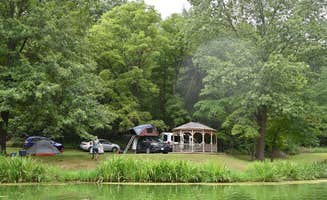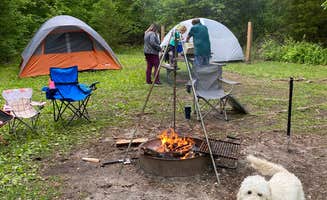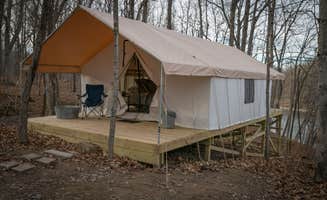Tent campsites near Brussels, Illinois provide access to the scenic confluence region where the Illinois and Mississippi Rivers meet. The area sits at elevations between 400-700 feet with limestone bluffs characterizing the landscape. Camping in this region often involves dealing with seasonal flooding concerns during spring months, with fall generally offering the most stable weather conditions.
What to do
Fishing opportunities: At William R. Logan Conservation Area, campers can access stocked lakes near the primitive camping areas. "There are some larger stocked lakes with another primitive camping area but the road was temporarily closed, so I wasn't able to check those out," explains a camper.
Hiking diverse terrain: The Little Lost Creek Conservation Area offers challenging hiking trails with significant elevation changes. "There is a great hike down into a valley with the actual Lost Creek at the bottom, completely worth the hard hike back up out of the valley," notes one visitor who appreciated the scenic rewards despite the difficulty.
Winery access: Campsites at Klondike Park provide convenient access to local wine country. "Close enough to wineries to bike to," mentions Annie C., while another camper notes, "This Campground places you in the heart of Missouri Wine Country and there's a perfect base for visiting the wineries and restaurants along highway 94."
What campers like
Affordability: Budget-conscious campers appreciate the reasonable rates at some campgrounds. "Ten dollars a night helps maintain land and natural area, all donation, very family oriented," notes a visitor to McCully Heritage Project, highlighting the value compared to more expensive camping options.
Privacy options: While some campgrounds have closer sites, others offer more secluded options. At Dr. Edmund A. Babler Memorial State Park, "Sites 52-75 are much more treed and have a private feel to them. It seems this is where most of the tent campers like to be," according to Nancy W.
Water recreation: Multiple campgrounds offer ponds suitable for various water activities. "A friend discovered this gem a while back and we now frequent it. Super inexpensive for the space that you get. Free firewood. We have only stayed at the largest site as it has good fishing and a place for us to launch our paddleboards and kayaks," explains a camper at McCully Heritage Project.
What you should know
Seasonal closures: Some conservation areas restrict camping during hunting seasons. At Little Lost Creek Conservation Area, a camper reported, "The conservation area is closed to camping during various hunting seasons (I ran into a hunter scoping out his turkey hunting spot for the following week's hunt)."
Facility limitations: Many primitive sites lack amenities. "No frills camping at about 8-10 sites near the main entrance off Route RA, with most being in an open circle configuration with the main road cutting through the middle. The only vault toilet was closed and a porta potty was set next to that," reports a camper at William R. Logan Conservation Area.
Road noise concerns: Some campgrounds experience highway noise. At St. Charles County Klondike Park, "Some sites are closer to the highway and cars flying down the road can make it hard to sleep but after midnight, they stopped," according to Jake K.
Tips for camping with families
Playground access: Some campgrounds offer play equipment for children. At McCully Heritage Project, one visitor notes, "I just love the bridge across the pond. We had a picnic and the kids got to play on the playground equipment."
Trail difficulty considerations: Assess trail difficulty for younger hikers. At Dr. Edmund A. Babler Memorial State Park, a camper observes, "The trails are not too long but can be challenging for small kids or folks that are not used to hiking."
Wildlife awareness: Prepare for wildlife encounters at campsites. "Make sure to store your food securely overnight - the racoons are pretty thick and hungry at night," warns a camper at St. Charles County Klondike Park, highlighting the importance of proper food storage with children.
Tips from RVers
Site limitations: Many campgrounds near Brussels have limited RV accommodation. A visitor to Dr. Edmund A. Babler Memorial State Park notes, "Not all sites are long enough for large RVs and the roads in some loops prevent you from turning around. The camp hosts we encountered are very helpful and have a list of site lengths and can tell you which ones are appropriate for large RVs."
Tent-focused environments: Most tent campsites in the region aren't designed for larger vehicles. "The campground is used a lot by RV and campers, not so much by tenters. Lots of campsites had electric. All had the standard pininic tables and fire rings, and the campground has a decent and clean shower house. You might end up pitching your tent on a parking pad as many tent sites don't have level grassy spots for your tent," explains Annie C. about Dr. Edmund A. Babler Memorial State Park.
Utility limitations: Most primitive sites lack RV hookups. Even at developed campgrounds like Dr. Edmund A. Babler Memorial State Park, a visitor mentions, "If this campground had sewer and water, it would get 5 stars."




